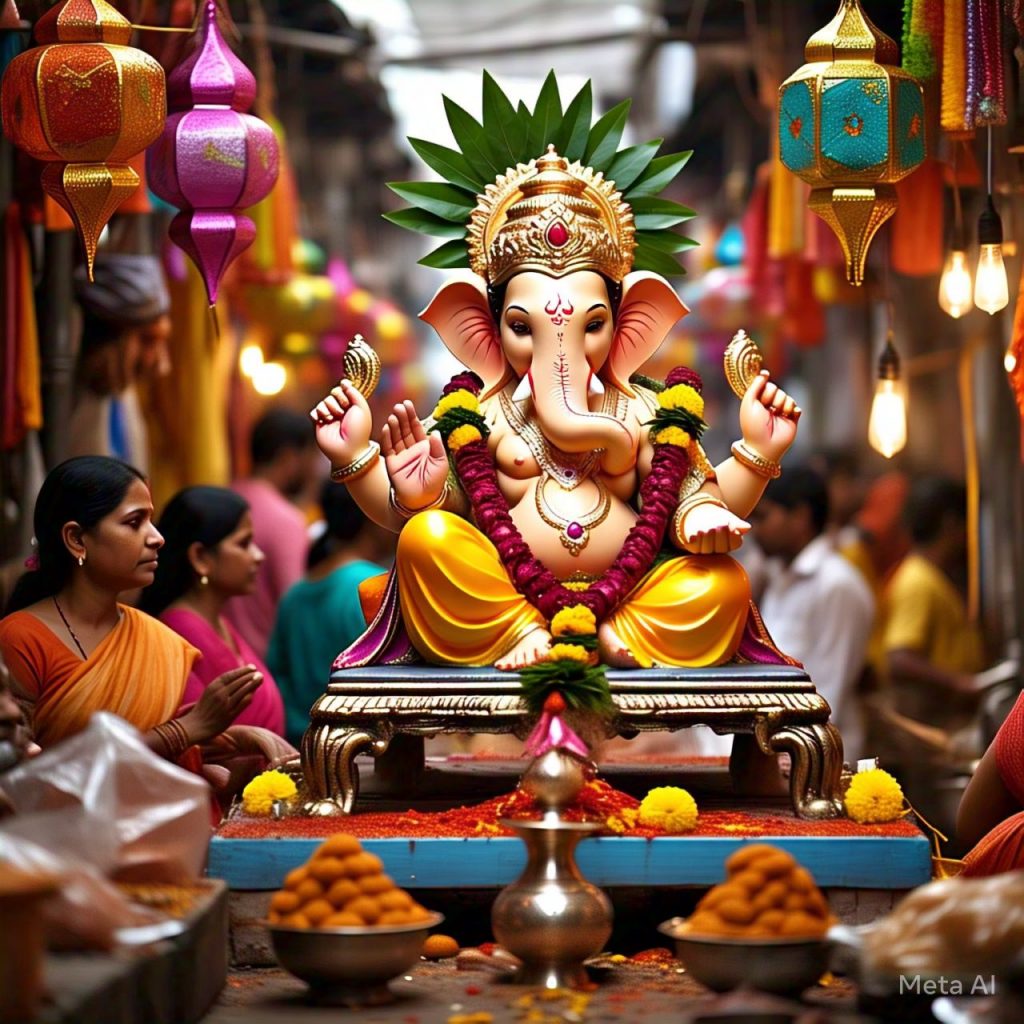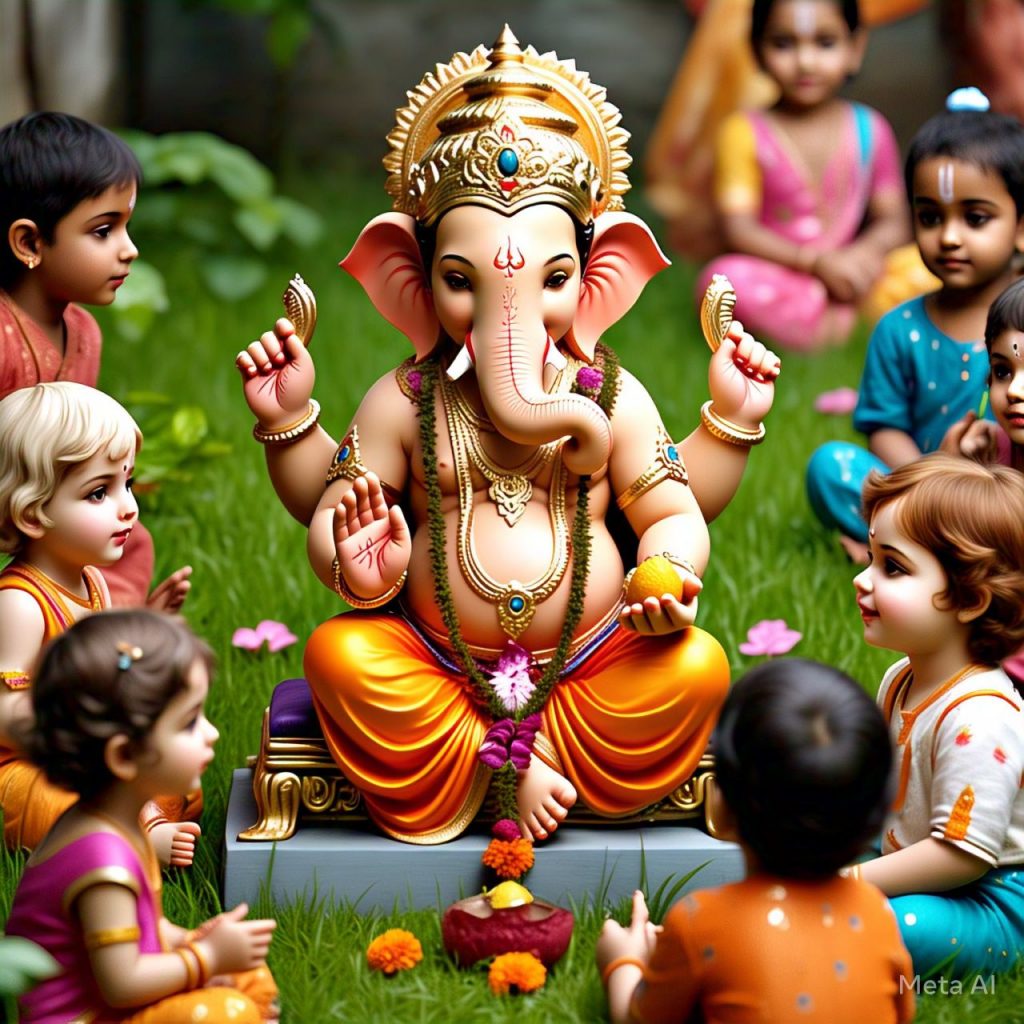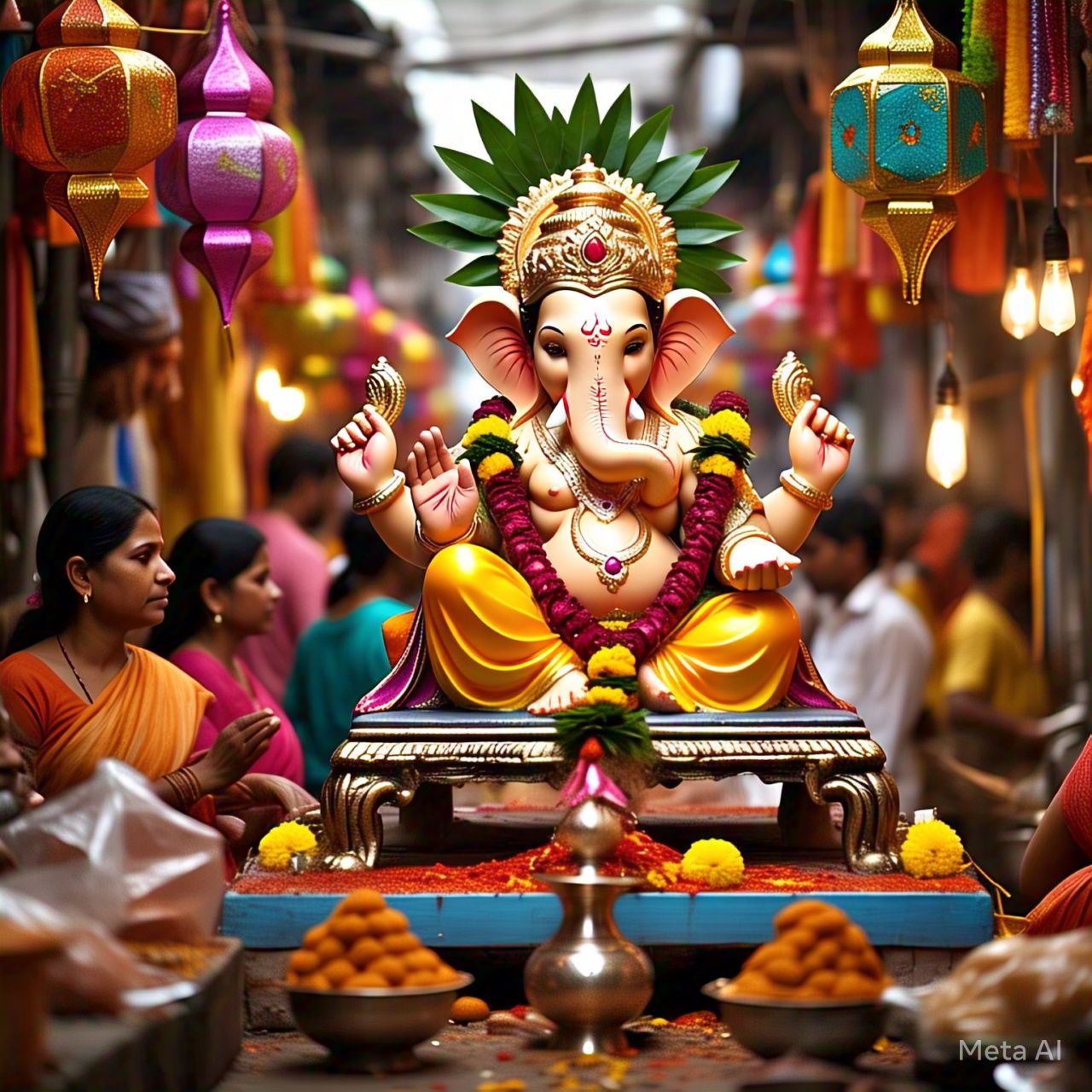Ganesh Chaturthi starts with a drumbeat.

Ganesh Chaturthi is a Hindu festival celebrated with great joy and devotion. It marks the birth of Lord Ganesha, the remover of obstacles and the god of wisdom and prosperity.
This festival usually falls in the month of August or September. People bring home beautiful clay idols of Lord Ganesha and worship them with flowers, sweets, and prayers. The most loved sweet of Ganesha is Modak, which is offered as prasadam.
The celebrations go on for 10 days, and on the last day, the idols are taken in a grand procession and immersed in water (visarjan). Devotees chant “Ganpati Bappa Morya, Pudhchya Varshi Lavkar Ya!” meaning “Come again soon next year, Lord Ganesha!”
Ganesh Chaturthi brings people together and spreads happiness.
That unmistakable rhythm echoing through narrow lanes, pulling people out of their homes, their shops, their hurried lives. Somewhere, someone yells, “Ganpati Bappa Morya!” and the crowd roars back in unison. It’s not just a chant—it’s a feeling. It’s the heartbeat of the people, louder than the dhols, brighter than the lights strung across balconies, stronger than the scent of modaks steaming in kitchens. And it’s not just a festival. It’s homecoming.
When I was little, I truly believed that Ganpati lived inside the idol. Every evening, I would sit cross-legged in front of the murti, whispering my secrets. Sometimes, I asked for silly things—like a new box of crayons or for the rain to stop so I could go outside and play. Back then, it all felt so real, as if he was truly there, listening. He felt real. Not distant like other gods. Ganpati was the god who came home, who sat in our living room, who watched us eat, dance, laugh, cry.
Bhajans, Prasad, and the Joy of Togetherness during Ganpati celebration
Our neighbors would come over, carrying steel tiffins filled with prasad. The kids would run around, trying to peek behind the decorations, while the elders sat in a circle singing bhajans. The evening aarti wasn’t just a ritual—it was a celebration. The diya flickering in front of the idol, the rhythmic clapping, the bell that rang just a second too late because someone always got distracted—it was all part of the charm.
But as the years went by, life changed. Somewhere between exams, job interviews, heartbreaks, and relocations, the excitement started fading. One year, I couldn’t even make it home. I saw the celebrations on a video call. My mother turned the phone around to show the idol. She said, “Say hi to Bappa.” And I did. But it didn’t feel the same.
It took me a while to understand that Ganesh Chaturthi isn’t just about the idol. It’s about what you bring with it. The devotion, yes. But also the memories, the intentions, the love.
One year, after a particularly rough patch in my life—when I’d lost a close friend and couldn’t find the strength to even get out of bed—my younger sister brought home a tiny Ganpati idol. Nothing fancy. Just a simple clay one. She placed it on a small wooden stool in our apartment, lit a diya, and said, “Let’s just sit here for a bit.”
Ganpati Bappa Comes, No Matter Where You Are
We didn’t chant mantras, didn’t do aarti. We didn’t have modaks. But for the first time in months, I felt a flicker of peace. Like Bappa had shown up not for rituals, but for me.
That’s the thing about Ganesh Chaturthi. It meets you where you are. In a grand pandal surrounded by lights and music. Or in a one-bedroom flat with one diya and a heart full of ache. Bappa doesn’t mind. He comes anyway.
In Mumbai, where I’ve lived for years now, the festival transforms the entire city. Trains are packed, the roads are chaotic, but no one complains. People wait hours just to get a glimpse of Lalbaugcha Raja. I once stood in that line. I remember the man in front of me who had walked barefoot from Vasai. When I asked why, he smiled and said, “Because he listens.”
Ganesh ji Listens—To Every Voice, Every Prayer
He listens. To the businessman praying for stability , the mother praying for her sick child. the student terrified of results, the migrant worker missing home, the newlywed couple starting life. To the heartbroken, the hopeful, the healing.
He listens.Every year, I try to bring Bappa home—even if it’s just a small clay idol placed on a shelf. I clean the space myself, buy flowers, light a diya, and sit with him. Sometimes, I talk, cry. I just sit in silence, letting the weight of the year fall off my shoulders.
Some years, I make modaks. The first time I tried, I burnt them. The kitchen filled with smoke, and I almost gave up. But then I remembered my mother’s laugh and how she used to say, “Bappa doesn’t mind burnt offerings. He sees the effort.” So I made them again. And again. Until I got them right. And when I placed them in front of the idol, they felt sacred—not because they were perfect, but because they were mine.
I’ve seen friends of all religions join in the celebration. My Muslim neighbor once came by during the visarjan procession, hands folded, eyes moist. “He’s everyone’s,” she said quietly. And she was right. Bappa doesn’t belong to one community. He belongs to anyone who calls out to him.
Faith in the Silence: A Ganesh Chaturthi

On the tenth day, as it comes time to bid farewell, the streets overflow with emotion. There’s the thunder of dhols, people dancing with abandon, and vibrant colors bursting through the air . All the celebration, however, there’s also a quiet heaviness—a lump in the throat that’s hard to ignore. While voices rise in unison chanting, “Pudcha varshi lavkar ya!”—Come again soon next year!—the joy is tinged with longing. And when the idol is finally immersed in the water, a part of me gently breaks. Yet, it’s not a painful shattering—it’s more like a soft surrender, a cleansing moment that makes space for something new to begin.
It’s a cleansing. Like letting go of something you’ve been carrying too long. A renewal.
A Goodbye That Heals during Ganpati celebration
Once, during visarjan, I saw a little boy holding his Ganpati with both hands. He looked like he didn’t want to let go. His father bent down and whispered something. That moment stayed with me. It reminded me that letting go doesn’t mean losing. Sometimes, it means trusting that what we love will return to us—in another form, another time.
Ganesh Chaturthi isn’t about perfection. It’s about presence, not about how grand your decoration is. It’s about how open your heart is. Bappa doesn’t need gold-plated thrones or fifty kinds of sweets. He needs sincerity. A quiet corner. A little bit of love.
Sometimes, I walk around the city during the festival just to feel the energy. I see teenagers handing out free water to the crowds,old uncles dancing with abandon, their shirts soaked in sweat. I see a street artist painting Bappa’s image on a cracked wall, turning something broken into something beautiful. That’s what this festival does—it transforms.
Every year, he comes home. To remind us that no obstacle is too big. That every ending carries a beginning. That the divine isn’t in the sky—it’s in the moments we choose faith over fear.
This year, whether you welcome him with a full-fledged celebration or simply whisper a quiet prayer in your room, remember this—he’s listening. No matter how big or small the gesture, what matters is the intention behind it.
Ganpati Bappa Morya. Mangal Murti Morya.
Come home, Bappa. We’ve been waiting.
